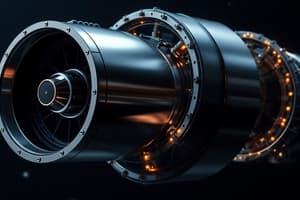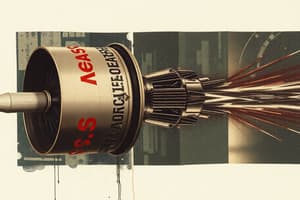Podcast
Questions and Answers
What is the main advantage of using liquid propellants in rocket engines?
What is the main advantage of using liquid propellants in rocket engines?
- Low density and ease of pumping
- High density and high specific impulse (correct)
- Reliability and wide usage in satellites
- Ability to use electric pumps with batteries
Why are gaseous propellants not commonly used in liquid-propellant rockets?
Why are gaseous propellants not commonly used in liquid-propellant rockets?
- High cost and limited availability
- Incompatibility with lightweight centrifugal turbopumps
- Low density and difficulty with common pumping methods (correct)
- Unsuitability for use with electric pumps
What technology allows some aerospace companies to use electric pumps with batteries in liquid rockets?
What technology allows some aerospace companies to use electric pumps with batteries in liquid rockets?
- High-pressure gas tanks
- Lightweight centrifugal turbopumps
- Inert gas stored at high pressure (correct)
- Tripropellant systems
In simpler small engines, what is sometimes used instead of pumps to force the propellants into the combustion chamber?
In simpler small engines, what is sometimes used instead of pumps to force the propellants into the combustion chamber?
Which type of rockets using two types of propellant are common in liquid rockets?
Which type of rockets using two types of propellant are common in liquid rockets?
What is a major advantage of monopropellant rockets in comparison to bipropellant rockets?
What is a major advantage of monopropellant rockets in comparison to bipropellant rockets?
Who first appeared the idea of a liquid rocket as understood in the modern context?
Who first appeared the idea of a liquid rocket as understood in the modern context?
Which Soviet rocket-engine designer pursued rocket research at the Gas Dynamics Laboratory (GDL)?
Which Soviet rocket-engine designer pursued rocket research at the Gas Dynamics Laboratory (GDL)?
What was the name of the Moscow based group formed by Fredrich Tsander for the study of Reactive Motion?
What was the name of the Moscow based group formed by Fredrich Tsander for the study of Reactive Motion?
Who replaced Fredrich Tsander as the head of GIRD?
Who replaced Fredrich Tsander as the head of GIRD?
Which rocket reached an altitude of 400 metres (1,300 ft) in the first Soviet liquid propelled rocket launch?
Which rocket reached an altitude of 400 metres (1,300 ft) in the first Soviet liquid propelled rocket launch?
Who was designing and building liquid rocket engines running on compressed air and gasoline in Moscow?
Who was designing and building liquid rocket engines running on compressed air and gasoline in Moscow?
What was the design that was one of the first engines to be regeneratively cooled by the liquid oxygen?
What was the design that was one of the first engines to be regeneratively cooled by the liquid oxygen?
Who influenced later rocket scientists throughout Europe?
Who influenced later rocket scientists throughout Europe?
In which year did Mikhail Tikhonravov launch the first Soviet liquid propelled rocket?
In which year did Mikhail Tikhonravov launch the first Soviet liquid propelled rocket?
In which book did the idea of a liquid rocket first appear in the modern context?
In which book did the idea of a liquid rocket first appear in the modern context?
Flashcards are hidden until you start studying
Study Notes
Advantages of Liquid Propellants
- Liquid propellants provide precise control of thrust levels, enhancing engine efficiency and performance.
- They allow for engine shut down and restart capabilities, critical for mission adaptability.
Gaseous vs. Liquid Propellants
- Gaseous propellants tend to have lower overall performance and do not offer effective combustion stability, making them less suitable for liquid rockets.
Technology in Liquid Rockets
- Electric pumps powered by batteries enable some aerospace companies to efficiently deliver propellant into the combustion chamber, reducing reliance on traditional pumps.
Propellant Delivery in Small Engines
- In smaller engines, pressurization methods such as gas cartridges or the use of bottled gases are sometimes employed instead of mechanical pumps to move propellants into the combustion chamber.
Common Rocket Types
- Bipropellant rockets, which utilize a combination of oxidizer and fuel, are predominant in liquid rocket technology, delivering better performance.
Monopropellant Advantages
- Monopropellant rockets are simpler and usually more reliable compared to bipropellant rockets, as they only require one propellant, reducing complexity and potential failure points.
Origins of Liquid Rocket Concept
- The notion of liquid rockets as understood today first emerged in the early 20th century, significantly attributed to advancements in rocketry.
Soviet Rocket Research
- The Gas Dynamics Laboratory (GDL) was explored by Konstantin Tsiolkovsky, a pioneer in rocket research, who contributed significantly to the field's development.
Historical Groups in Rocketry
- The group that Fredrich Tsander established in Moscow for studying Reactive Motion was known as GIRD (Group for the Investigation of Reactive Motion).
Leadership Changes in GIRD
- After Fredrich Tsander, Mikhail Tikhonravov took over leadership of GIRD and further propelled Soviet rocketry research.
First Soviet Liquid Rocket Launch
- The first Soviet liquid propelled rocket launch reached an impressive altitude of 400 meters (1,300 feet), marking a significant milestone in space exploration.
Development of Liquid Rocket Engines
- In Moscow, engineers were experimenting with designs that utilized compressed air and gasoline for liquid rocket engines, laying the groundwork for future advancements.
Innovations in Engine Cooling
- One notable early engine design utilized liquid oxygen for regenerative cooling, enhancing performance and efficiency.
Influence on European Rocket Science
- Early Soviet rocket scientists, including Tsiolkovsky and his contemporaries, had a profound influence on rocket research and development across Europe.
Key Milestone Year
- Mikhail Tikhonravov successfully launched the first Soviet liquid propelled rocket in 1933, marking a pivotal moment in the history of rocketry.
Literature on Liquid Rockets
- The concept of liquid rockets was first articulated in the modern context within the book "The Exploration of Cosmic Space by Means of Reaction Devices" by Konstantin Tsiolkovsky.
Studying That Suits You
Use AI to generate personalized quizzes and flashcards to suit your learning preferences.




